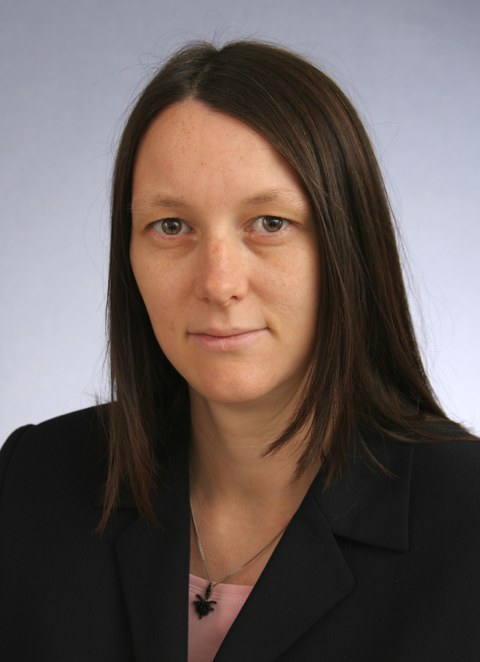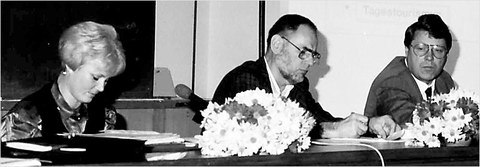A few questions for a former "HfV" student
(Interview from 2014)
Susann Mayer
Kerstin Wegener is a graduate of the former "Friedrich List" Hochschule für Verkehrswesen (University of Transportation) in Dresden. She decided to study the economics of tourism in the 1980s. At the time, it was a niche subject that was highly coveted. Today, she is Professor of Tourism Management at Frankfurt University of Applied Sciences.
As she studied from 1987 to late 1991, she was one of the few students to start their degrees in the GDR and graduate after the fall of the Berlin Wall and therefore the reunification of Germany. After graduation, she remained at HfV as an executive assistant and research associate at ITE – Institut zur Förderung und Integration des Tourismus in Europa (the institute for the promotion and integration of tourism in Europe). She worked closely with Armin Godau, one of the HfV professors who had successfully guided her – and many of her peers – to her degree.
Kontakt spoke to Prof. Kerstin Wegener about her memories of that time

Prof. Kerstin Wegener
Prof. Wegener, what prompted you to study the economics of tourism at the old Hochschule für Verkehrswesen (University of Transportation)?
I loved languages and traveling. And I loved Dresden. (And still do.) My father had also studied at HfV.
What were the defining aspects of a degree at HfV in the late 1980s?
HfV had a strong focus, interdisciplinary collaboration, and transportation-centered research. This obviously had an influence on course content; mobility played a significant role. Specialists taught many of the applied subjects, such as tourist transport infrastructure. And studying in comparatively small seminar groups was intense and demanding. There was close (personal) support from teaching staff, in particular during the years immediately following the fall of the Berlin Wall, and this meant we were able to complete our degrees successfully, albeit a little late. We were also very fortunate that immediately after the reunification of the country, many experienced managers and researchers from West Germany and abroad came to lecture at HfV. For example, I remember lectures from Heinz Runau, CEO of Deutsche Lufthansa AG; I believe that was part of the transport economics course.
You studied, worked and did your doctorate there. Can you briefly describe your academic career?
After my degree, as already mentioned, I worked as an executive assistant and research associate at ITE, and was then at Deutsche Bahn AG in Frankfurt am Main for many years, always working at the interface of tourism and mobility – for example tourism policy, Deutsche Bahn partnerships with tourist destinations and environmental associations, and group rail travel. I then completed my doctorate while working and was appointed to a professorship at Frankfurt University of Applied Sciences in early 2013. I am now in charge of the tourism management cooperative degree program.
More than 40 years of HfV history came to an end in 1992. How did you find the incorporation of HfV into TU Dresden as a new faculty?
I can't really judge that process; I was too inexperienced – I wasn't really familiar with the structures of the university. However, there was a sense of optimism, of a fresh start. Many people wanted to make a difference, to take advantage of the new opportunities for research and personal development. Others, on the other hand, had reservations, and some were afraid of change, which I think is very human.

1990: Dr. Margita Großmann (left) and Prof. Armin Godau (right) taught tourism economics at HfV
Later, you earned your doctorate at the Faculty of Transport and Traffic Sciences, despite the fact that you were already living in Frankfurt am Main. What made you opt for TUD and a doctorate under a former HfV lecturer?
It was both the subject itself and Prof. Stopka (TUD Chair of Information and Communication Business Management & Economics) as an academic and as a person that moved me to complete my doctorate under her alongside my day job. I had already worked with Prof. Stopka on an extensive study lasting several years that ITE had undertaken for Deutsche Telekom, and had come to appreciate her expertise. Ever since then, the interface of tourism and telecommunications had been a field that fascinated me. I received a lot of support from Prof. Stopka and her staff over the course of my part-time doctorate. I would like to take this opportunity to express my warmest thanks to them; support like that cannot be taken for granted.
Thank you for talking with us.
Contact details:
c/o TU Dresden
Alumni Relations Office
Email: Susann Mayer
Website: HfV Dresden
